As loving pet parents, we constantly strive to provide the best for our furry companions, and that often includes sharing our lives, homes, and sometimes, even our food. While it’s tempting to treat your dog to a bite of what you’re having, many common human foods can be incredibly dangerous, even toxic, to dogs. Understanding what dogs can’t eat is not just beneficial, it’s critical for their health and well-being. Pet poisonings are a significant threat, with hundreds of thousands of incidents occurring annually in the United States alone. While not all are food-related, household foods are a major contributor to these alarming statistics. This comprehensive guide from Dog Care Story aims to be your essential “cheat sheet,” empowering you with the knowledge to safeguard your beloved canine from potentially harmful ingredients found in your pantry or on your plate. Being prepared with accurate information on foods to avoid, alongside knowing what is safe, is the first step in ensuring your dog lives a long, healthy, and happy life free from preventable food-related hazards. For a more detailed look at what fruits should be avoided, you can check out our article on what fruits can dogs not eat list.
Why Certain Foods Pose a Risk to Dogs
The digestive systems and metabolic processes of dogs are remarkably different from those of humans. This fundamental biological distinction explains why humans can safely consume a wide array of foods that are harmful, or even fatal, to dogs. A dog’s body processes certain substances at a much slower rate or lacks the specific enzymes required to break them down effectively, leading to a dangerous buildup of toxins in their system.
Consider chocolate, a well-known canine culprit. Dogs metabolize theobromine and caffeine – both methylxanthines found in chocolate – much slower than humans. This means these compounds remain in their system longer, accumulating to toxic levels that can result in severe illness or even death. Similarly, while a cherry might be a harmless snack for you, its pits, stems, and leaves contain cyanide, which can be problematic if ingested in large quantities by a dog. Moreover, the physical hardness of fruit pits can cause gastrointestinal obstruction and diarrhea, making it prudent to avoid them entirely.
It’s also crucial to understand that food toxicity isn’t a one-size-fits-all issue. A dog’s reaction to a toxic food can vary significantly based on their size, breed, individual health condition, and the amount consumed. A small breed dog, for instance, may experience severe symptoms from a dose that would barely affect a much larger dog. Puppies and senior dogs may also have compromised digestive or immune systems, increasing their vulnerability. This variability underscores the importance of consulting your veterinarian if you ever have questions or concerns about specific foods and your dog’s unique needs.
Comprehensive List of Foods Dogs Absolutely Cannot Eat
Many everyday household foods, seemingly innocuous to humans, are dangerous—and often toxic—to dogs. While some may only cause mild gastrointestinal upset, others can lead to life-threatening conditions. This comprehensive guide highlights the most common and critical foods to keep entirely out of your dog’s reach. Remember, this is not an exhaustive list, but it covers the primary culprits you must be vigilant about.
Alcohol
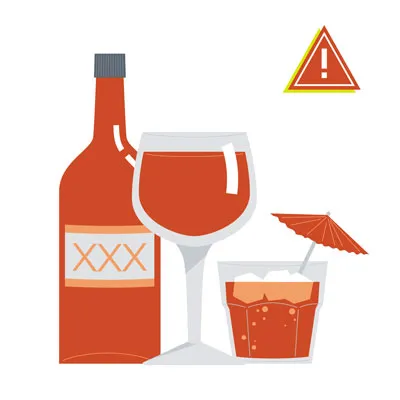 Alcohol beverage in a glass with ice
Alcohol beverage in a glass with ice
Alcohol in any form is extremely dangerous for dogs. Due to their smaller body size and differing metabolism, even a minuscule amount of alcohol can have a devastating and potentially fatal effect. The severity of poisoning increases proportionally with the dog’s size and the amount consumed. Sources of alcohol can include alcoholic beverages, fermented dough (like raw bread dough), certain rotten fruits, and even some household products. Symptoms of alcohol poisoning in dogs mirror those in humans but are often more severe and rapid in onset, including vomiting, disorientation, staggering, excessive drooling, lethargy, breathing difficulties, tremors, seizures, coma, and ultimately, death. It’s imperative to keep all alcoholic substances securely stored and out of your dog’s access.
Fruit Pits and Seeds (Apples, Apricots, Cherries, Plums, Peaches)
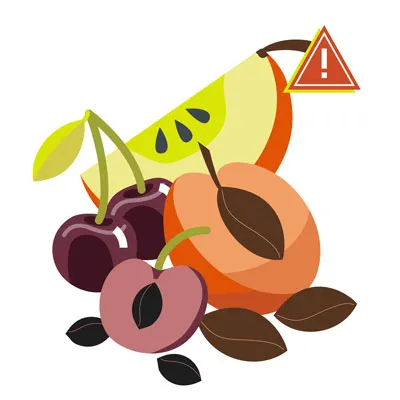 Assortment of apple, apricot, cherry, and plum seeds and pits
Assortment of apple, apricot, cherry, and plum seeds and pits
While the fleshy parts of many fruits can be safe in moderation, their seeds and pits are a different story. Apple seeds, along with the pits from apricots, cherries, peaches, and plums, contain cyanide. Although a small number of apple seeds might not immediately cause a problem, consistent ingestion or a larger quantity can lead to cyanide poisoning. Symptoms of cyanide poisoning are severe and include dilated pupils, difficulty breathing, bright red gums, shock, and potentially death due to the inability of red blood cells to effectively carry oxygen. Beyond chemical toxicity, these pits and seeds also pose a significant physical hazard. Their hard, irregular shapes can cause choking, especially in smaller dogs, or lead to dangerous gastrointestinal obstructions that may require emergency surgery. It’s always best to remove all pits and seeds before offering any fruit to your dog.
Avocado
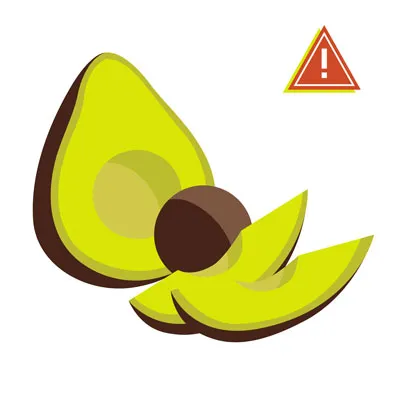 Sliced avocado with a pit
Sliced avocado with a pit
Avocados are a controversial food for dogs, but it’s generally best to avoid them. The primary concern is a fungicidal toxin called persin, which is present in the fruit, pit, leaves, and bark of avocado plants. While the level of persin in the fruit pulp is often considered low enough not to be acutely toxic to dogs, large amounts can still cause stomach upset, vomiting, and diarrhea. More significantly, studies have shown severe myocardial damage and even death in other animal species after avocado ingestion. Furthermore, the large, hard avocado pit presents a clear choking hazard and can cause a serious gastrointestinal obstruction if swallowed whole, necessitating immediate veterinary intervention. Given these risks, it’s safer to omit avocado from your dog’s diet entirely.
Broccoli
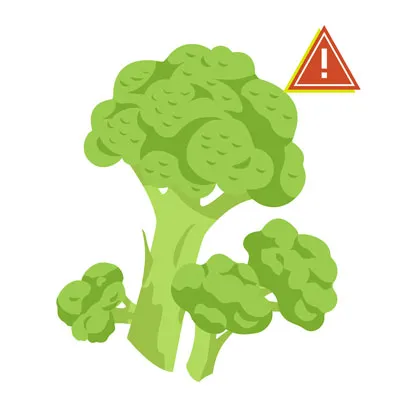 Fresh broccoli florets
Fresh broccoli florets
Broccoli contains isothiocyanates, compounds that, while generally beneficial to humans, can be harmful to dogs in very large doses. Small amounts of broccoli might be tolerable for some dogs, but excessive consumption can lead to significant gastrointestinal irritation, manifesting as severe stomach upset, gas, bloating, and diarrhea. Additionally, the fibrous stalks of broccoli can pose a choking hazard for dogs, and larger pieces may become lodged in the esophagus or intestinal tract, causing an obstruction. With so many other genuinely healthy and safe vegetable options available for dogs, it’s probably best to choose an alternative treat to avoid any potential risks associated with broccoli.
Caffeine and Coffee Grounds
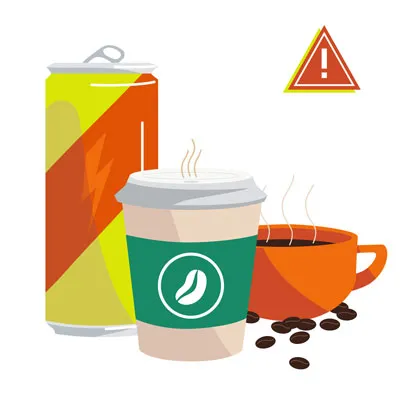 Coffee beans and grounds with a coffee cup
Coffee beans and grounds with a coffee cup
Caffeine is a potent stimulant that is highly toxic to dogs. It belongs to a class of compounds called methylxanthines, which also includes theobromine found in chocolate. Dogs are far more sensitive to these compounds than humans due to their slower metabolism, which allows toxins to accumulate rapidly. Common sources of caffeine include coffee beans, coffee grounds, tea, soda, energy drinks, and even some medications or dietary supplements. Ingesting caffeine can lead to a range of severe symptoms, including hyperactivity, restlessness, excessive panting, vomiting, diarrhea, tremors, elevated heart rate (tachycardia), abnormal heart rhythms, seizures, and in severe cases, collapse and death. If you suspect your dog has ingested any amount of caffeine, seek immediate veterinary care.
Fatty Meats and Bones (Chicken & Turkey Skin, Ham, Other Fatty Cuts)
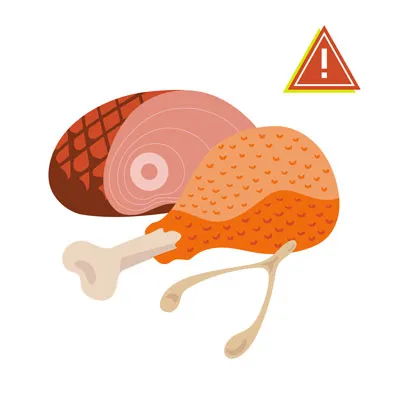 Various cuts of fatty meat including chicken and turkey skin, and ham
Various cuts of fatty meat including chicken and turkey skin, and ham
While dogs are natural carnivores, not all meat is created equal when it comes to their health. Fatty cuts of meat, such as chicken or turkey skin, ham, bacon, and excessive fat trimmed from other meats, are incredibly rich in fat. Consuming these high-fat foods can trigger acute pancreatitis in dogs—a painful and potentially life-threatening inflammation of the pancreas. Pancreatitis can lead to severe abdominal pain, vomiting, diarrhea, lethargy, and dehydration, often requiring intensive veterinary care.
Furthermore, feeding bones, particularly cooked bones, is extremely dangerous. Cooked bones become brittle and can easily splinter, posing risks of choking, internal organ punctures (stomach or intestines), or severe gastrointestinal blockages. These complications can lead to fatal abdominal infections or require emergency surgery. Even raw bones carry risks of bacterial contamination (like Salmonella or E. coli) and potential dental damage. Therefore, it’s best to avoid feeding your dog any type of bone or excessively fatty meat scraps. If you’re wondering what is the one meat dogs should avoid, highly processed and fatty meats like ham are definitely on that list.
Chocolate
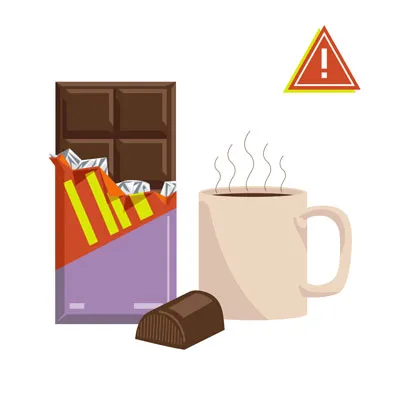 Assorted chocolate bars and cocoa powder
Assorted chocolate bars and cocoa powder
Chocolate remains one of the most frequently reported causes of pet poisoning, especially during holidays when it’s readily available. The primary toxic components in chocolate are theobromine and caffeine, both methylxanthines. Dogs metabolize these substances very slowly, allowing them to build up to toxic levels. The darker and more bitter the chocolate, the higher its concentration of theobromine, making baker’s chocolate and dark chocolate the most dangerous. However, even milk chocolate or chocolate-flavored products can be harmful, particularly if consumed in large quantities or by small dogs. Some sugar-free chocolates also contain xylitol, which adds another layer of toxicity.
Symptoms of chocolate poisoning can include hyperactivity, restlessness, vomiting, diarrhea, increased thirst, panting, tremors, abnormal heart rhythms, seizures, and in severe cases, collapse and death. The severity depends on the amount and type of chocolate ingested relative to the dog’s body weight. If your dog consumes any amount of chocolate, regardless of how small, it is considered an emergency, and you should contact your veterinarian immediately.
Grapes and Raisins
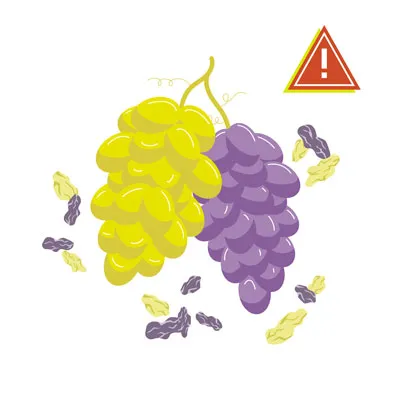 Fresh grapes and dried raisins
Fresh grapes and dried raisins
Grapes and raisins are exceptionally dangerous for dogs and can cause acute kidney failure. The exact toxic mechanism is still not fully understood, but current research points to tartaric acid as a key culprit. Even a small number of grapes or raisins can be toxic, and the reaction is highly individual – some dogs may eat a few without issue, while others can suffer severe kidney damage from just one. All forms of grapes and raisins are toxic, including fresh, dried, in baked goods, or grape juice.
Symptoms of grape or raisin poisoning typically appear within 6-12 hours and can include vomiting, diarrhea, lethargy, loss of appetite, abdominal pain, dehydration, and increased thirst. As kidney damage progresses, symptoms can include decreased or absent urine production. Prompt veterinary attention is crucial for successful treatment and to prevent irreversible kidney damage.
Macadamia Nuts, Almonds, and Pistachios
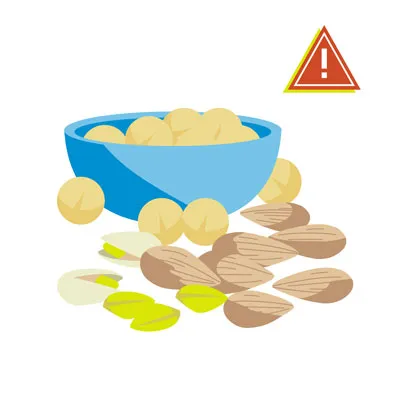 Macadamia nuts, almonds, and pistachios in a bowl
Macadamia nuts, almonds, and pistachios in a bowl
Macadamia nuts are highly toxic to dogs, even in small quantities. As few as six nuts can cause severe poisoning in a small dog, leading to symptoms such as weakness (particularly in the hind legs), ataxia (incoordination), tremors, vomiting, fever, and depression. While the exact toxic compound and mechanism are still unknown, these symptoms typically appear within 12 hours of ingestion and usually resolve within 24-48 hours with supportive care, though veterinary consultation is always recommended.
Other nuts, while not as acutely toxic as macadamia nuts, also pose risks. Almonds and pistachios are not easily digestible for dogs and can cause gastrointestinal upset, including vomiting and diarrhea, due to their high fat content. More importantly, their hard shells and large size present significant choking hazards and can lead to intestinal obstructions. Furthermore, many commercially available nuts are salted, seasoned, or flavored, which can introduce other harmful ingredients like excessive sodium or spices. Therefore, it is best to avoid feeding dogs any type of nut. For a broader understanding of meat safety for dogs, you might want to read our article on what meat dogs should not eat.
Milk and Dairy Products
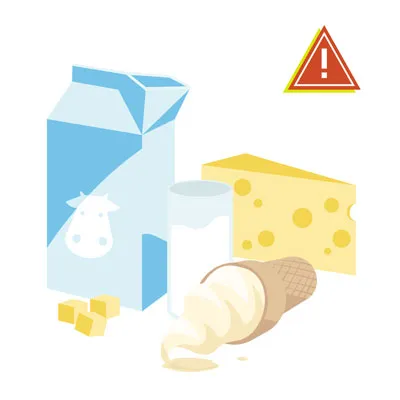 Glass of milk with dairy products
Glass of milk with dairy products
While the image of a dog happily lapping up milk is common, many dogs are actually lactose intolerant. This means they lack sufficient amounts of the enzyme lactase, which is necessary to break down lactose, the sugar found in milk and dairy products. For these dogs, consuming milk, ice cream, or other dairy items can lead to uncomfortable gastrointestinal issues such as diarrhea, gas, bloating, and abdominal pain.
Beyond lactose intolerance, many dairy products, especially ice cream, are high in sugar and fat. High sugar content is unhealthy for dogs and can contribute to weight gain and other health problems, while high-fat foods can trigger pancreatitis, as discussed earlier. Cheese, in small quantities, can be acceptable for some dogs as a high-value treat, especially lower-fat varieties. However, it should still be given sparingly and only if you are certain your dog doesn’t have a dairy sensitivity. It’s always safer to opt for plain water or veterinarian-approved treats instead of dairy.
Mushrooms
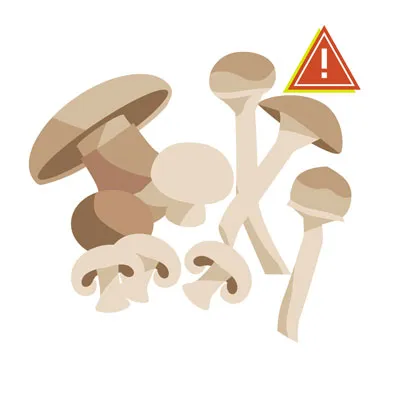 Assorted fresh mushrooms
Assorted fresh mushrooms
When it comes to mushrooms, it is always safest to err on the side of caution and avoid feeding them to your dog. While some cultivated mushrooms, like the white button mushrooms from a grocery store, are generally considered non-toxic, many wild mushroom species are highly poisonous to dogs and can cause severe illness or death. Wild mushrooms contain a vast array of toxins that can affect multiple organ systems, leading to symptoms such as vomiting, diarrhea, abdominal pain, lethargy, tremors, ataxia, hallucinations, jaundice, kidney failure, and liver failure.
Distinguishing between safe and toxic wild mushrooms is incredibly difficult, even for experienced foragers. Given the high risk and potentially fatal consequences of ingesting a poisonous mushroom, it is crucial to prevent your dog from eating any mushrooms found outdoors. If your dog consumes a wild mushroom, treat it as an emergency and seek immediate veterinary attention.
Nutmeg and Cinnamon
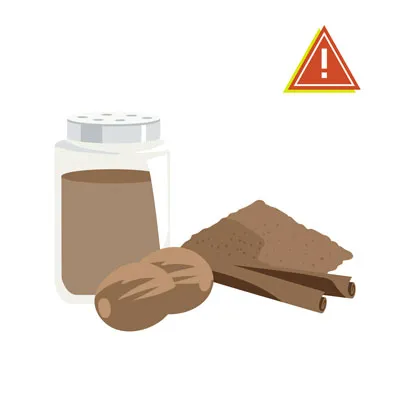 Nutmeg and cinnamon sticks with powder
Nutmeg and cinnamon sticks with powder
Nutmeg contains myristicin, a compound that can be toxic to dogs, especially in larger doses or for smaller breeds. Ingesting nutmeg can cause gastrointestinal upset, drowsiness, disorientation, increased heart rate, high blood pressure, and in severe cases, hallucinations, tremors, and seizures. While the amount typically used in baking might seem small, it’s best to avoid all foods containing nutmeg for your dog’s safety.
Cinnamon, on the other hand, is not considered toxic in small amounts. However, large quantities can irritate a dog’s mouth and digestive tract, leading to discomfort, coughing, choking, and vomiting. Inhalation of cinnamon powder can cause lung irritation and breathing difficulties. More concerningly, in very high doses, cinnamon can potentially lower a dog’s blood sugar levels, which can be dangerous, particularly for diabetic dogs or those prone to hypoglycemia. Therefore, it is prudent to keep cinnamon and nutmeg-spiced foods out of your dog’s reach.
Onions, Garlic, Chives, and Leeks
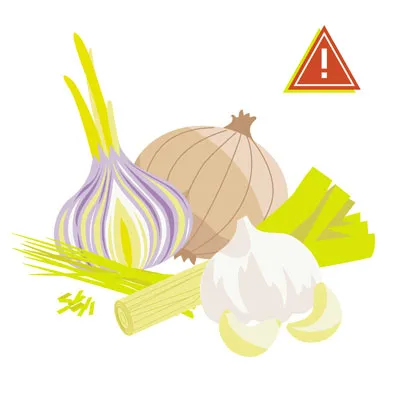 Onions, garlic, chives, and leeks
Onions, garlic, chives, and leeks
All members of the Allium family, including onions, garlic, chives, and leeks, are highly toxic to dogs. These plants contain sulfoxides and disulfides, compounds that can damage a dog’s red blood cells, leading to hemolytic anemia. This condition can result in weakness, lethargy, pale gums, rapid breathing, and even collapse. Garlic is considered significantly more potent than onions, meaning a smaller amount can cause toxicity.
The toxic effects can be cumulative, meaning repeated exposure to small amounts can be as dangerous as a single large ingestion. Cooked, raw, powdered, or dehydrated forms are all toxic. These ingredients are commonly found in many human foods, including sauces, soups, baby food, and processed snacks, making label reading essential. Certain Japanese breeds, such as Akitas and Shiba Inus, are thought to be particularly sensitive. Immediate veterinary care is required if you suspect your dog has ingested any amount of these vegetables or their powders.
Salt
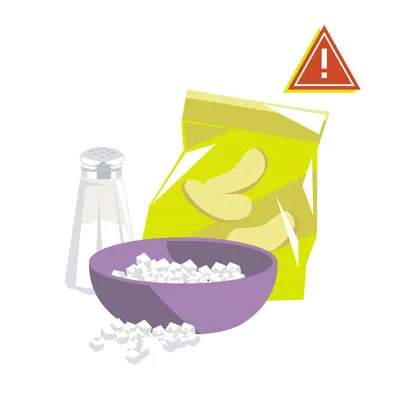 Salt crystals on a surface
Salt crystals on a surface
While dogs need a small amount of sodium in their diet for proper bodily functions, excessive salt intake can be extremely dangerous. Too much salt can lead to sodium ion poisoning, which disrupts the fluid balance in a dog’s cells, causing swelling in the brain and other organs. This can result in a range of severe neurological symptoms. Common sources of excessive salt include salted snacks (chips, pretzels), table salt, highly processed human foods, and even homemade playdough or rock salt used for de-icing.
Symptoms of salt poisoning include excessive thirst, frequent urination, vomiting, diarrhea, lethargy, tremors, incoordination, seizures, and in severe cases, coma and death. Always ensure your dog has access to fresh, clean water, and strictly limit their intake of salty human foods. If your dog consumes a large amount of salt, contact your veterinarian immediately.
Spicy Food
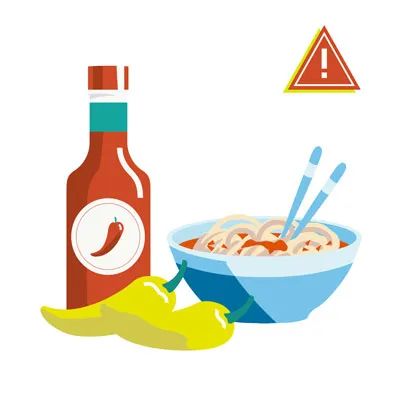 Red chili peppers and other spicy ingredients
Red chili peppers and other spicy ingredients
Spicy foods, while not typically “toxic” in the same way as chocolate or xylitol, are highly irritating and can cause significant discomfort and health issues for dogs. The capsaicin found in chili peppers and other spicy ingredients can lead to severe gastrointestinal upset, including intense stomach pain, vomiting, diarrhea, and excessive thirst. In some cases, it can even cause stomach ulcers. Dogs may also experience irritation in their mouth, eyes, and nose.
Feeding spicy foods to your dog offers no nutritional benefit and only risks their immediate comfort and health. It can also lead to expensive emergency veterinary visits. It’s always best to stick to bland, dog-safe treats and avoid sharing any spicy human meals with your pup.
Sugar-Free Gum & Candy (Xylitol)
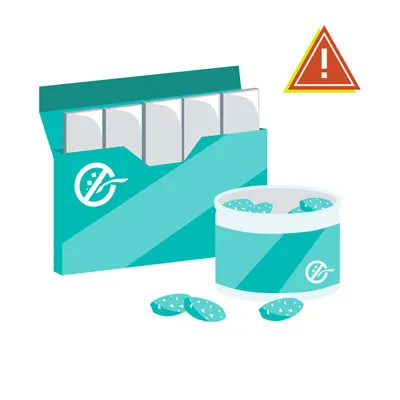 Sugar-free gum and candy with "Xylitol" label
Sugar-free gum and candy with "Xylitol" label
Xylitol is an artificial sweetener that is extremely toxic to dogs and is considered one of the most dangerous human food ingredients for canines. Found in many “sugar-free” products—including gum, candy, mints, baked goods, peanut butter, toothpaste, and some medications—xylitol can cause a rapid and profound drop in a dog’s blood sugar (hypoglycemia). This occurs because dogs absorb xylitol quickly, and their bodies mistake it for real sugar, releasing a large amount of insulin, which then drastically lowers blood glucose levels.
Symptoms of xylitol poisoning can appear within 15-30 minutes and include weakness, lethargy, staggering, collapse, vomiting, and seizures. In higher doses, xylitol can also cause severe liver failure, which can be fatal. The amount of xylitol in just five pieces of sugar-free gum has the potential to be lethal to a 65-pound dog. Given its widespread presence and extreme toxicity, it is crucial to check labels meticulously and keep all products containing xylitol completely out of your dog’s reach.
Tomatoes and Raw Potatoes
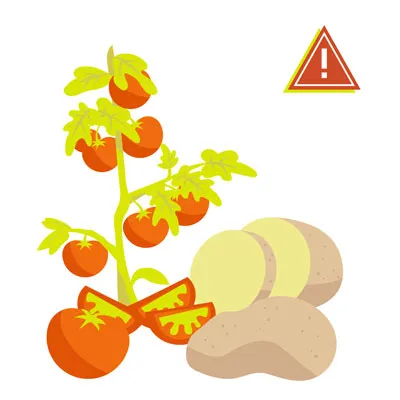 Green tomatoes and raw potatoes
Green tomatoes and raw potatoes
Tomatoes and potatoes fall into a category of “safe in some forms, unsafe in others.” Ripe, red tomatoes are generally considered safe for dogs in moderation. However, the green parts of the tomato plant—the leaves, stems, and unripe (green) tomatoes—contain solanine, a toxic alkaloid. Solanine can cause gastrointestinal upset, lethargy, weakness, and neurological symptoms in dogs. It’s best to remove all green parts and only offer small amounts of fully ripened, red tomatoes.
Similarly, cooked potatoes (baked or boiled, plain) are generally safe for dogs in small quantities. However, raw potatoes, especially those with green spots or sprouts, also contain solanine and should be avoided. Cooked potatoes offer some nutritional value, but always ensure they are prepared without any added salt, butter, oils, or seasonings.
Tobacco
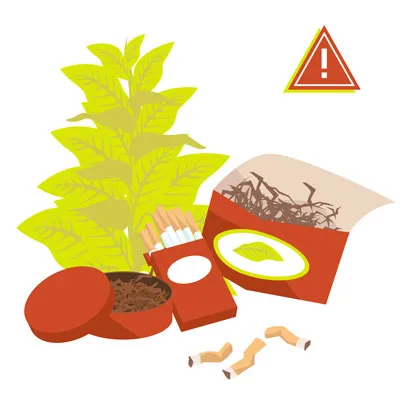 Tobacco products including cigarettes and chew
Tobacco products including cigarettes and chew
Tobacco products, including cigarettes, cigars, chewing tobacco, nicotine patches, e-cigarettes, and cigarette butts, are highly dangerous and toxic for dogs due to their nicotine content. Nicotine is a potent neurotoxin that can cause a rapid onset of severe symptoms. Dogs are naturally curious and may ingest tobacco left on sidewalks, in ashtrays, or in discarded products.
Symptoms of nicotine poisoning include vomiting, diarrhea, drooling, agitation, hyperactivity, rapid or labored breathing, abnormal heart rate, muscle weakness, wobbliness, tremors, and seizures. In cases of significant exposure, symptoms can progress to blue gums (cyanosis), collapse, coma, and can ultimately be fatal. If your dog ingests any tobacco product, even a cigarette butt, it is a medical emergency requiring immediate veterinary attention. Time is critical for successful treatment.
Yeast and Raw Dough
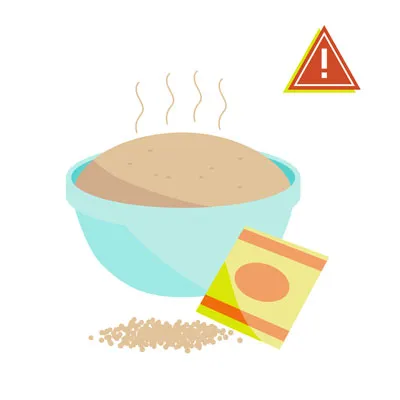 Raw bread dough with yeast
Raw bread dough with yeast
Yeast and raw dough are exceptionally unsafe for dogs due to two primary concerns. Firstly, raw dough, especially bread dough, can expand significantly in the warm, moist environment of a dog’s stomach. This expansion can cause severe abdominal pain, bloating, and gastric dilation-volvulus (GDV), also known as bloat—a life-threatening condition where the stomach twists, cutting off blood supply. This requires immediate emergency surgery.
Secondly, the yeast in raw dough ferments the sugars, producing alcohol. This fermentation process occurs within your dog’s stomach, leading to rapid alcohol toxicity. Symptoms of alcohol toxicity in dogs (as described earlier) can quickly become severe and fatal without immediate medical intervention. Therefore, raw dough should always be kept far out of your dog’s reach.
Raw Meat
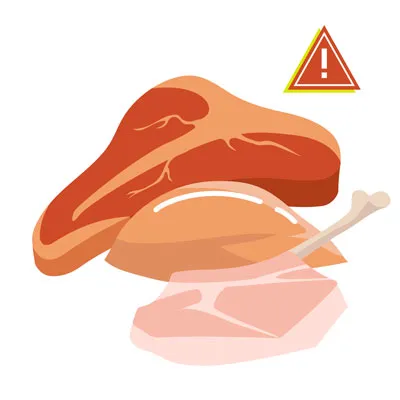 Raw meat cuts on a chopping board
Raw meat cuts on a chopping board
While the ancestral diet of dogs included raw meat, feeding raw or undercooked meat to domestic pets carries significant risks. The primary concern is bacterial contamination, specifically from pathogens like Salmonella, E. coli, Listeria, and Campylobacter. These bacteria can cause severe gastrointestinal illness in dogs, leading to vomiting, diarrhea, lethargy, and in some cases, can even be transmitted to humans, posing a public health risk, particularly for immunocompromised individuals in the household.
Additionally, raw meat often contains bones, which, regardless of whether they are raw or cooked, pose choking hazards and the risk of internal injury or obstruction. While some proponents advocate for raw feeding, it requires meticulous handling, balanced nutrition, and careful sourcing, which is often difficult for the average pet owner to achieve safely. The safest approach is to ensure all meat offered to your dog is thoroughly cooked to eliminate bacterial risks. If you are exploring what foods are generally safe for dogs, remember that cooked, plain meats are preferred, which you can learn more about in our article on what food is safe to feed dogs.
Rhubarb
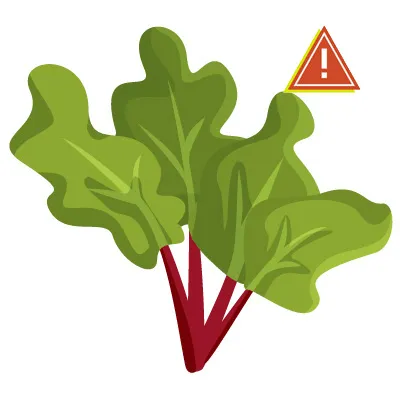 Fresh rhubarb stalks
Fresh rhubarb stalks
Rhubarb, a plant commonly used in human desserts like pies, is not safe for pets. Its leaves, and to a lesser extent the stalks, contain soluble calcium oxalate crystals. When ingested in sufficient quantities, these crystals can bind with calcium in the body, causing a dangerous drop in systemic calcium levels (hypocalcemia). This can lead to serious health issues, including acute kidney failure.
Symptoms of rhubarb poisoning in dogs can include excessive drooling, loss of appetite, vomiting, diarrhea, tremors, weakness, bloody urine, and changes in thirst and urination patterns. Due to the potential for severe renal damage, any suspected ingestion of rhubarb should prompt an immediate call to your veterinarian.
Star Fruit
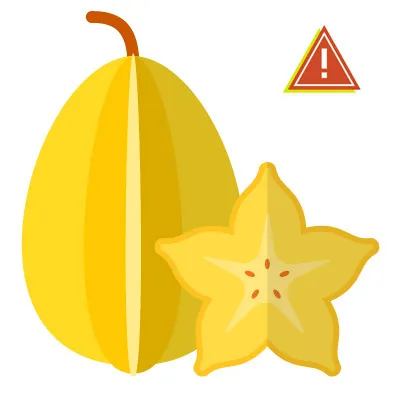 Sliced star fruit
Sliced star fruit
Similar to rhubarb, star fruit also contains soluble calcium oxalate crystals. While this tropical fruit might be a visually appealing treat for humans, it poses a risk to dogs. Ingestion of star fruit, particularly in larger amounts, can lead to the same concerns as rhubarb poisoning, including a dangerous drop in calcium levels and the potential for kidney damage. Dogs with pre-existing kidney conditions are especially vulnerable. It’s best to keep this exotic fruit off your dog’s menu to avoid any unnecessary health risks.
Flavored Water and Seltzer Water
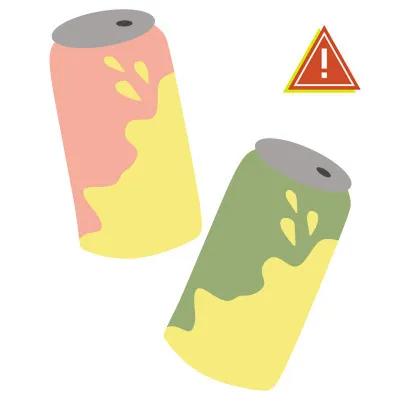 Bottles of seltzer and flavored water
Bottles of seltzer and flavored water
While hydration is essential for dogs, stick to plain, fresh water for your canine companion. Flavored waters and seltzer waters, while seemingly harmless, can contain additives that are dangerous to pups. Many flavored waters are sweetened with sugar, artificial sweeteners (like xylitol, which is highly toxic), or contain other chemical flavorings that are not suitable for dogs.
Seltzer water, or carbonated water, may not be acutely toxic if plain, but the carbonation can cause gas, bloating, and discomfort for your dog. For some dogs, significant bloating can even escalate to dangerous conditions like bloat (GDV). The safest and healthiest option for your dog’s hydration is always clean, fresh, plain tap water. Avoid offering them any sparkling or flavored beverages.
Foods That Are Generally Safe for Dogs
While the list of foods dogs can’t eat is extensive, there are indeed many human foods that are perfectly safe and even beneficial when given in moderation and prepared correctly. These can serve as healthy, natural treats that add variety to your dog’s diet. Always remember to introduce new foods slowly, in small amounts, and consult your vet if you have any concerns. Some popular and safe options include lean cooked meats (without skin, fat, or bones), plain cooked eggs, certain fruits (like apples without core/seeds, blueberries, bananas without peel, watermelon without rinds/seeds), and many vegetables (such as carrots, green beans, and cucumber).
Which Dogs Are Most Vulnerable to Toxic Foods?
While all dogs are at risk if they ingest toxic foods, certain factors can increase a dog’s vulnerability and the severity of their reaction. Recognizing these heightened risks can help pet owners be even more vigilant.
Small Breeds vs. Large Breeds: Smaller dogs are generally more susceptible to toxicity. Their lower body weight means that even a small amount of a toxic substance can lead to a much higher concentration in their system compared to a large dog consuming the same quantity. This is particularly critical with toxins like chocolate or xylitol, where dosage per pound is a major factor.
Puppies: Young dogs have less developed digestive and immune systems, making them more vulnerable to the harmful effects of certain substances. Their bodies may not be as efficient at metabolizing or eliminating toxins, and their developing organs are more easily damaged. Puppies are also naturally more curious and prone to exploring their environment with their mouths, increasing their risk of accidental ingestion.
Elderly Dogs: Older dogs may have compromised organ function (e.g., liver, kidneys) or other underlying health conditions that make them more sensitive to toxins. Their ability to metabolize and excrete harmful substances may be reduced, and they may have a harder time recovering from illness.
Dogs with Pre-existing Conditions: Dogs suffering from chronic illnesses such as diabetes, kidney disease, liver disease, pancreatitis, or gastrointestinal sensitivities are at a significantly higher risk. Their existing health issues can be exacerbated by toxic foods, or their body’s ability to cope with the toxins may already be impaired. Always discuss any dietary changes or potential food exposures with your veterinarian if your dog has an underlying health condition. This is especially true for specific breeds like Golden Retrievers, who might have specific dietary sensitivities; for more on this, consult our article on what can golden retrievers eat and not eat.
Practical Strategies to Prevent Your Dog from Eating Toxic Foods
Accidents can happen, but proactive measures are crucial to minimize the risk of your beloved pup encountering unsafe human foods. Implementing a few simple strategies can significantly enhance your dog’s safety.
1. Store Foods Out of Reach
The most effective prevention strategy is to ensure all potentially toxic foods are stored securely and out of your dog’s access. This means keeping dangerous items on high shelves, in locked cabinets, or in sealed containers that your dog cannot chew through or open. Be mindful of counter surfing dogs; what seems out of reach to you might be a tempting target for a determined pup. Don’t leave groceries unattended on the floor or low surfaces.
2. Avoid Feeding Dogs from Your Plate
Resist the urge to feed your dog scraps from your plate or directly from the kitchen while you’re cooking, even if it’s just a “small treat.” This practice can establish bad habits, encouraging begging and teaching your dog that human food is fair game. It also makes it difficult for family members or guests to understand what’s safe and what’s not. It’s safest to only give your dog treats that are specifically formulated and approved for canine consumption.
3. Educate Family Members and Guests
Ensure everyone in your household, including children, and any guests, understands the importance of not feeding your dog human food, especially items from the “can’t eat” list. Explain why certain foods are harmful and emphasize that even a small amount can be dangerous. Clear communication can prevent well-meaning but harmful actions.
4. Be Extra Cautious During Holidays and Gatherings
Holidays, parties, and family gatherings often involve an abundance of human food, increased activity, and distractions, making it easy to let your guard down. Be extra vigilant during these times. Keep serving dishes out of reach, promptly clean up any spills, and dispose of food waste securely in lidded bins that your dog cannot access. Consider confining your dog to a safe, quiet space with their own dog-specific treats during meal times or parties to eliminate temptation.
Being prepared for an emergency is also part of prevention. Keep contact information for your veterinarian and a 24/7 pet poison control helpline readily accessible. Knowing who to call and having their number handy can save precious time in a crisis.
What to Do If Your Dog Ingests a Toxic Substance
Even with the best preventative measures, accidents can happen. If you suspect your dog has eaten something toxic, acting quickly and appropriately is paramount.
Recognize the Symptoms of Food Toxicity
Symptoms can vary widely depending on the type and amount of toxin ingested, as well as your dog’s individual sensitivity. Common signs of food toxicity can include:
- Vomiting (with or without blood)
- Diarrhea (with or without blood)
- Lethargy or weakness
- Restlessness or hyperactivity
- Excessive drooling
- Loss of appetite
- Increased thirst or urination
- Abdominal pain or bloating (stomach may feel hard to the touch)
- Tremors, seizures, or disorientation
- Changes in heart rate or breathing
- Pale or unusually colored gums
If you observe any of these symptoms or suspect ingestion, do not wait for symptoms to worsen.
Take Immediate Action:
- Call Your Veterinarian or a Pet Poison Control Center Immediately: This is the most crucial step. Do not attempt to induce vomiting or administer any home remedies without explicit instructions from a veterinary professional. Depending on the substance, inducing vomiting can sometimes be more harmful. Have their numbers saved in your phone.
- Be Ready with Information: When you call, be prepared to provide as much detail as possible, including:
- The specific food or substance ingested: If possible, have the packaging, label, or a clear description of the item.
- The approximate amount consumed: Even a rough estimate is helpful.
- The time of ingestion: Knowing how long ago it happened is critical for treatment decisions.
- Your dog’s breed, age, and weight.
- Any observed symptoms.
- Any pre-existing medical conditions your dog has.
- Follow Veterinary Instructions: Your veterinarian or the poison control expert will guide you on the next steps, which may include bringing your dog in for immediate treatment, monitoring at home, or specific first aid instructions. Treatments may include inducing vomiting (if appropriate), administering activated charcoal to absorb toxins, IV fluids, medications to support organ function, or even surgery in cases of obstruction. The earlier treatment is initiated, the better the prognosis.
Dog Care Story Can Help You Keep Your Dog Healthy
Navigating the world of human foods and understanding what dogs can and can’t eat can feel overwhelming, especially with the myriad of household toxins beyond food that also pose a threat. Dogs, with their indiscriminate tastes, sometimes eat things we can’t fathom. However, by adhering to this comprehensive guide and maintaining constant vigilance, you can significantly protect your canine companion from foods that could harm them.
The good news is that there are abundant safe and healthy food options your dog can enjoy! Explore the list of safe foods with your dog, discovering their favorites, and offer them as rewarding treats when they’ve been good. When in doubt about any food item, the safest course of action is always to consult with your trusted veterinarian.
At Dog Care Story, we are committed to providing you with the most reliable and actionable information to ensure your dog’s well-being. Understanding potential dangers is a critical part of responsible pet ownership. For added peace of mind and protection against unexpected incidents like accidental toxin ingestion, consider enrolling your furry friend in a comprehensive pet insurance plan. Many providers offer coverage for emergency treatments related to poisoning, and some even provide 24/7 helplines, allowing you to speak with a veterinary expert anytime you’re worried about something your pet may have eaten. Taking these steps empowers you to keep your dog healthy, happy, and safe for years to come.
References
- “Top 10 dog poisons,” Hilary Parker (5/2023), WebMD.
- “What happens if a dog eats chocolate?” (10/2023), Colorado State University.
- “Fruits and vegetables dogs can or can’t eat,” (3/2024), American Kennel Club.
- “What to do if your dog drinks alcohol,” Jerry Klein (7/2023), American Kennel Club.
- “Can dogs eat apples?” Hector Joy (12/2022), PetMD.
- “Can dogs eat plums?” Katie Koschalk (7/2023), Chewy.
- “Avocado (Persea spp) Toxicosis in Animals,” Cristine Hayes (9/2024), Merck Veterinary Manual.
- “People foods to avoid feeding your pets,” (n.d.), ASPCA.
- “People foods dogs can and can’t eat,” (3/2024), American Kennel Club.
- “Can dogs eat nuts?” Amanda Ardente (1/2023), PetMD.
- “Can dogs drink milk?” Sandra C. Mitchell (1/2024), PetMD.
- “Can dogs have nutmeg?” Barri J. Morrison (11/2023), PetMD.
- “Onion, garlic, chive, and leek poisoning in dogs,” Renee Schmid et al. (2024), VCA Animal Hospitals.
- “Can dogs eat tomatoes?” Anna Burke (10/2024), American Kennel Club.
- “Can dogs eat potatoes?” Katherine Ripley (11/2023), American Kennel Club.
- “What to do if your dog eats a cigarette butt,” (6/2023), American Kennel Club.
- “Dough & dogs: Why it’s bad and what you can do,” Lisa Goldstein (7/2024), Preventive Vet.
- “Rhubarb,” (n.d.), Pet Poison Helpline.
- “Can dogs drink carbonated water?” Heather Logue (n.d.), Rover.
- “What fruits can dogs eat?” Ellen Malmanger (2/2024), PetMD.
- “Can dogs have green beans?” Anna Burke (8/2022), American Kennel Club.
- “About pet food safety,” (4/2024), CDC.
